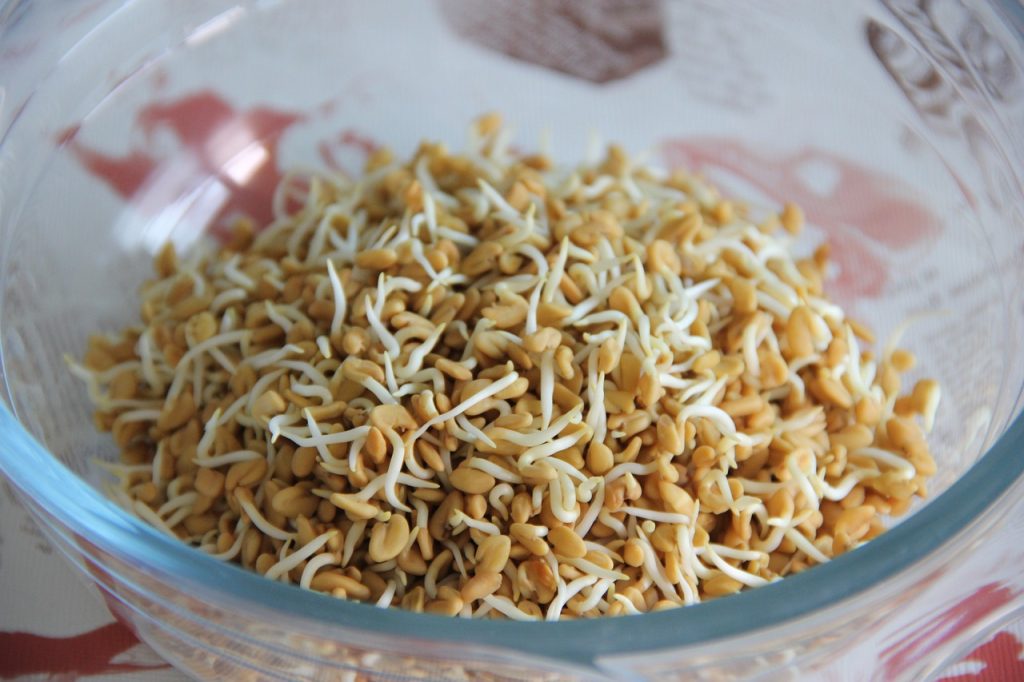Table of Contents
Fenugreek, scientifically known as Trigonella foenum-graecum, is an herb that belongs to the legume family. Fenugreek seeds are also used for medicinal purposes due to their numerous health benefits.

What is Fenugreek?
Fenugreek is an annual herb that belongs to the family Fabaceae. It is native to the Mediterranean region, southern Europe, and western Asia. The plant grows up to two feet tall and produces small, golden-brown seeds that have a bitter taste and a strong aroma. The seeds and leaves of the plant are used for medicinal purposes.
Nutritional Fact about Fenugreek
Macronutrients
- Calories: 323
- Carbohydrates: 58g
- Protein: 23g
- Fat: 6g
- Fiber: 25g
Micronutrients
- Calcium: 176mg
- Iron: 33.53mg
- Magnesium: 191mg
- Phosphorus: 296mg
- Potassium: 770mg
- Zinc: 2.5mg
- Vitamin C: 3mg
Amazing Health Fact about Fenugreek
Digestive Health
Fenugreek has been traditionally used to improve digestive health. It contains soluble fiber, which can help regulate bowel movements and prevent constipation. Fenugreek also has anti-inflammatory properties that can help reduce inflammation in the gut and relieve symptoms of digestive disorders such as irritable bowel syndrome (IBS) and ulcerative colitis.
Blood Sugar Control
Fenugreek has been shown to help regulate blood sugar levels in people with diabetes. It contains compounds that can slow down the absorption of sugar in the stomach and stimulate insulin production, which can help lower blood sugar levels.
Milk Production
Fenugreek is commonly used by nursing mothers to promote milk production. It contains compounds that can stimulate the production of prolactin, a hormone that is essential for milk production. Studies have shown that fenugreek can increase milk production in nursing mothers by up to 50%.
Testosterone Booster
Fenugreek has been shown to increase testosterone levels in men. It contains compounds that can increase the production of testosterone, which can help improve muscle mass, strength, and libido. Fenugreek has also been shown to improve sperm count and quality.
Menstrual Cramp Relief
Fenugreek has been traditionally used to relieve menstrual cramps. It contains compounds that can help relax the muscles in the uterus and reduce inflammation, which can help relieve pain and discomfort associated with menstrual cramps.
Skin Health

Fenugreek has been used in traditional medicine to treat various skin conditions such as eczema and acne. It contains compounds that have anti-inflammatory and antimicrobial properties, which can help reduce inflammation and prevent bacterial growth on the skin.
Hair Growth
Fenugreek has been shown to promote hair growth and prevent hair loss. It contains compounds that can improve blood flow to the scalp and stimulate the growth of new hair follicles.
Weight Loss
Fenugreek has been shown to help promote weight loss by reducing appetite and increasing feelings of fullness. It contains soluble fiber, which can help regulate blood sugar levels and reduce cravings for sugary and high-fat foods.

Anti-Inflammatory Properties
Fenugreek has anti-inflammatory properties that can help reduce inflammation throughout the body. It contains compounds such as flavonoids and alkaloids that can inhibit the production of inflammatory enzymes and reduce the release of inflammatory molecules. This makes fenugreek useful for treating conditions such as arthritis, asthma, and other inflammatory diseases.
Respiratory Health
Fenugreek has been traditionally used to improve respiratory health. It contains compounds that can help reduce inflammation in the lungs and relieve symptoms of respiratory disorders such as asthma and bronchitis. Fenugreek can also help relieve congestion and promote the expulsion of mucus from the respiratory tract.
Immune System Booster
Fenugreek has immune-boosting properties that can help strengthen the immune system. It contains compounds such as polysaccharides and saponins that can stimulate the production of immune cells and enhance their activity. This makes fenugreek useful for preventing and treating infections and other immune-related disorders.
Cardiovascular Health
Fenugreek has been shown to have cardiovascular benefits. It contains compounds that can help reduce cholesterol levels and improve blood flow, which can help reduce the risk of heart disease. Fenugreek can also help regulate blood pressure and prevent blood clots, further reducing the risk of heart disease.
Anti-Cancer Properties
Fenugreek has been shown to have anti-cancer properties. It contains compounds such as diosgenin and saponins that can inhibit the growth and spread of cancer cells. Fenugreek has been studied for its potential to prevent and treat various types of cancer, including breast, colon, and prostate cancer.
Pain Relief
Fenugreek has been traditionally used to relieve pain. It contains compounds that can help reduce inflammation and pain in the body. Fenugreek can be used to treat various types of pain, including menstrual cramps, headaches, and muscle pain. Anti-Aging Properties
How to Use Fenugreek in Cooking?

Spice blends
Fenugreek is a common ingredient in many spice blends, such as curry powder, garam masala, and berbere. These blends can be used to season meats, vegetables, and soups.
Dried leaves
Fenugreek leaves, also known as kasuri methi, can be used to add flavor to dishes such as soups, stews, and curries. They have a slightly bitter taste and a strong aroma that pairs well with other spices.
Sprouts
Fenugreek seeds can be sprouted and added to salads or sandwiches for a healthy and nutritious boost.
Baked goods
Fenugreek can be used to flavor bread, cakes, and cookies. It pairs well with other warm spices such as cinnamon and ginger.
Potential Side Effects of Fenugreek
- Upset stomach
- Diarrhea
- Bloating
- Gas
- Maple syrup-like odor in urine and sweat
FAQs
Is fenugreek safe to consume?
While fenugreek is generally safe for most people, it can interact with certain medications and may not be suitable for everyone. It is always best to consult with a healthcare provider before adding fenugreek to your diet or supplement routine.
Can fenugreek help with weight loss?
Yes, fenugreek can help to promote weight loss by increasing feelings of fullness and reducing overall calorie intake. It can also help to improve insulin sensitivity, which can help to reduce the risk of obesity and metabolic syndrome.
How can fenugreek be consumed?
Fenugreek can be consumed in various forms, such as seeds, leaves, and supplements. It can be added to dishes for flavor or taken in supplement form.
Can fenugreek help with menopause symptoms?
Yes, fenugreek can help to reduce the symptoms of menopause, such as hot flashes and mood swings. It contains compounds that can help to regulate hormone levels and reduce inflammation.
Are there any side effects of consuming fenugreek?
While fenugreek is generally safe, some people may experience side effects such as digestive upset or allergic reactions. It is important to use fenugreek safely and to consult with a healthcare provider if you experience any adverse effects.
Conclusion
Fenugreek is a versatile herb that has been used for centuries for its flavor and potential health benefits. It is a rich source of vitamins and minerals and has been shown to have several potential health benefits, including improving digestion, regulating blood sugar levels, boosting testosterone levels, reducing inflammation, and supporting milk production in breastfeeding women.















